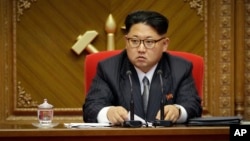The United Nations Security Council unanimously voted Wednesday to impose a new round of targeted economic sanctions against North Korea for its September 9 nuclear test.
The sanctions take aim at sectors of the defiant nation’s economy that generate cash to fund its nuclear and ballistic missile programs, and could cost Pyongyang more than $800 million a year in lost funds – the equivalent of a quarter of its total export revenues.
The resolution focuses its toughest action on Pyongyang’s coal export industry, which, according to global trade figures, is expected to generate over $1 billion in revenue this year and is the country’s single largest source of external funds.
Coal exports
The resolution imposes a hard, binding cap that will cut the country’s coal exports by more than 60 percent -- that could add up to some $700 million per year, experts said.
“This coal export revenue has not been used to help the people of North Korea; it has been used to further build up the regime’s illegal weapons programs,” U.S. United Nations Ambassador Samantha Power told the council.
An additional $100 million would come from prohibitions on exports of copper, nickel, silver and zinc. Tens of millions more could be lost from the country’s lucrative giant bronze statue export industry.
In addition, the council has designated for asset freezes and travel bans 11 North Korean officials and 10 entities involved in the development, production and financing of the country’s illicit weapons programs, its coal sector and conventional arms trade.
The United States and China began negotiating the new measures shortly after North Korea tested what it said was a hydrogen bomb in September.
“The resolution adopted by the council today demonstrates the uniformed stand of the international community against the development by DPRK of its nuclear and ballistic missiles and for the maintenance of international nuclear non-proliferation regime,” said China’s U.N. ambassador, Liu Jieyi.
The council has imposed several rounds of increasingly harsher, targeted sanctions on North Korea since 2006. Diplomats said they have slowed its march toward a nuclear weapon, but have so far failed to induce Pyongyang to abandon its atomic ambitions.
Ban addresses council
In a rare occurrence, U.N. Secretary-General Ban Ki-moon was present in the council for the vote.
“The DPRK must reverse its course and move onto the path of denuclearization through sincere dialogue,” Ban said. “I reiterate my call on the DPRK to take the necessary steps to reduce tensions in the region,” he added.
The U.N. chief is a former South Korean foreign minister and considered a likely presidential candidate in his home country after his U.N. term expires on December 31.
Council members made clear that the resolution does not target the North Korean people or seek to exacerbate their already difficult humanitarian circumstances.
South Korea’s envoy, Oh Joon, said that this year alone, it is estimated that Pyongyang has spent more than $200 million for nuclear tests and missile launches and that the total cost of its nuclear program has surpassed $1 billion.
“This could have been used to buy one year’s worth of food for the entire North Korean population,” he said. “People need to eat food, not weapons.”











